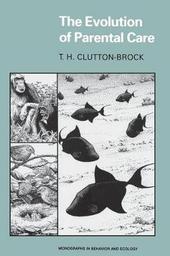
|
The Evolution of Parental Care
Paperback / softback
Main Details
| Title |
The Evolution of Parental Care
|
| Authors and Contributors |
By (author) T. H. Clutton-Brock
|
| Series | Monographs in Behavior and Ecology |
|---|
| Physical Properties |
| Format:Paperback / softback | | Pages:368 | | Dimensions(mm): Height 235,Width 152 |
|
| Category/Genre | Applied ecology |
|---|
| ISBN/Barcode |
9780691025162
|
| Classifications | Dewey:591.56 |
|---|
| Audience | | Professional & Vocational | | Tertiary Education (US: College) | |
|---|
|
Publishing Details |
| Publisher |
Princeton University Press
|
| Imprint |
Princeton University Press
|
| Publication Date |
21 March 1991 |
| Publication Country |
United States
|
Description
Synthesizing studies of parental care in a wide variety of animals, this book is the first attempt to provide general answers to the following important questions: Why does the extent of parental care vary so widely between species? Why do only females care for eggs and young in some animals, only males in others, and both parents in a few? To what extent is parental care adjusted to variation in its benefits to offspring and its costs to parents? How do parents divide their resources between their sons and daughters? In this book separate chapters examine the evolution of variation in egg and neonate size, of viviparity and other forms of bearing, and of differences in the duration of incubation, gestation, and lactation. The book reviews theoretical and empirical predictions concerning the evolution of parental care and examines the extent to which these are supported by empirical evidence. The author examines the distribution of parental care among offspring, reviews the empirical evidence that parents invest to different extents in their sons and daughters, and discusses the degree to which parents manipulate the sex ratio of their progeny in relation to the availability of resources.
Reviews"Clutton-Brock's book is a lucidly written and comprehensive review of the literature. It is an essential guide for those who wish to know who cares and how in the animal kingdom."--New Scientist
|